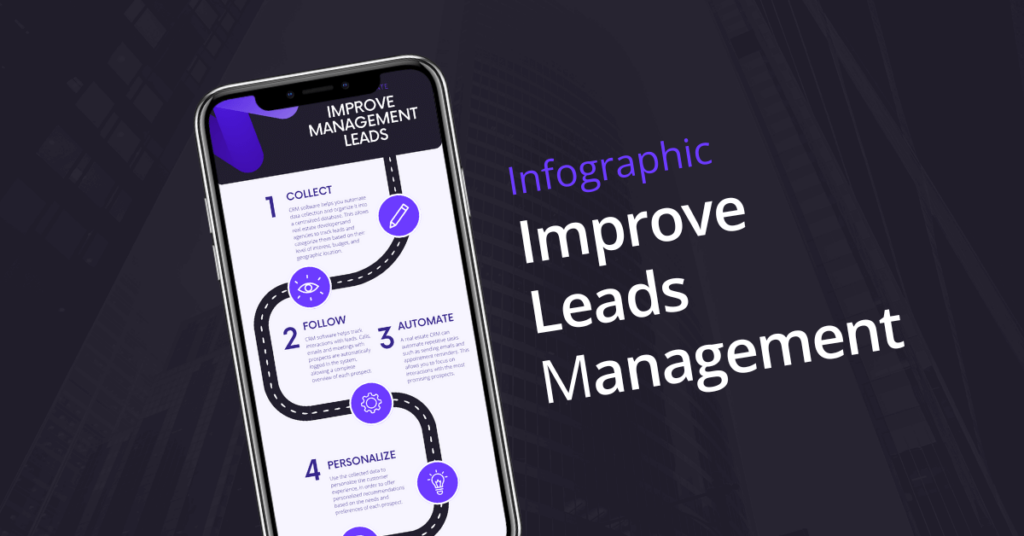In a previous article, we talked about the pitfalls to avoid when you are a real estate developer and want to purchase a CRM to facilitate sales. In fact, it’s one thing to know what to avoid when thinking about such integration, but it’s another thing to consider how exactly you can make it a great success. Here are some best practices that could help you integrate software to support your sales and marketing strategies.
Take advantage of current market fluctuations
By choosing a digital solution, new developers have a greater opportunity to build their brand and capture the ever-changing real estate market.
Indeed, a good digital platform will allow you to improve your marketing strategies, for example, by tracking active campaigns, analyzing old and current data to make predictions about future projects or maintaining communication with past potential buyers. Although it can be intimidating to implement new technology, seeing it as an opportunity to evolve your current practices sets you up for success.
Adopting software that will help you develop your brand, analyze important data to sell your new projects and create solid sales campaigns based on what you learn through the software is something no-one should consider working without so it would be wise not to postpone your data analytics platform further.
Perform detailed analysis of available platforms
There are several digital real estate solutions on the market, which is why it is important to analyze each one carefully before making your choice. It should be noted that, over the years, there has been a major surge in money invested in property tech across the world. This means that companies have created innovative technologies specifically targeting real estate, as many see it as a good investment opportunity.
Therefore, if you are considering purchasing a new digital solution to support your sales and marketing efforts, take the time to seriously evaluate the different software options available to you. There will definitely be one that meets your needs, whether you’re looking to better manage clients and inventories or go further and automate everything that surrounds the development of a project.
Research based on your needs
In the same vein, not all software is equal and your business does not necessarily need all the different options available either. It can be a major mistake to buy any new proptech or new software just because it’s trendy, especially when dealing with new developments where profit margins can be at risk due to external factors.
As mentioned earlier, doing your own research not only means understanding what software is available, but also means that you are really taking into account your needs and those of the team when selecting the best for your business.
It should be noted that all the pieces of software are created differently even if they are marketed in the same way. Indeed, two CRM for real estate can have completely different brand values. For example, one might suggest that real estate agencies should have simple methods of tracking their buyers while the other will focus on teams that need an overview of the data. They do not focus on the same clientele as their target is different.
To understand your team’s needs, it is important to determine what you’re looking for from the software in terms of value and return on investment. This process will guide your research and also later remind you why you chose it in the past.
In short, software should strike a balance between being an easy-to-use, functional tool and allowing a return on investment.
Take full advantage of the training and coaching offered
When companies choose a new CRM, most companies want it fully operational as quickly as possible, especially when there is a project launch or a new sales office opening. This is also true for product launches, as it’s an advantage to have a CRM that allows your team to start generating leads and managing purchases as quickly as possible.
The most modern software will offer training as part of their core services. Some will even offer support and a “customer success” option to help your team use the software to its full potential. Finding the right partner who will hand-hold your sales team and make sure everyone is on-board is not as easy as it sounds so making the right choice is crucial.
Also, when you do find the right partner for your CRM implementation, involving your entire sales team in the training sessions is essential to ensure that all members have a solid grasp of the tools offered, which they can them implement in their daily work. In addition, for a management or administration team, this training is equally essential because it can help guide the sales team by giving them an idea of the type of data and reports they can extract. In both situations, initial training and coaching provide a solid foundation for success across the board.
In short, make sure that the training session is put on your team’s agenda so that they can get all the benefits from the software.
Conclusion
After considering the pitfalls to avoid in a previous article, here is what to remember in terms of the best practices when purchasing a real estate CRM: properly identify your needs and those of your team in order to better guide your choice of software and get informed about the support services regarding its implementation in order to take full advantage of the software. In short, be conscientious about the selection of your CRM and ask the right questions during its demonstration.
Ask the Onyx Technologies team, their job is to make the lives of developers and their sales team much easier with their innovative software.




